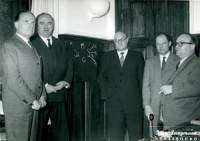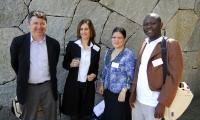IAMCR Profile
 IAMCR is a global professional association of media and communication researchers. It is supported by the voluntary contributions of many people, including more than 80 Section and Working Group chairs and deputies, 30 members of its International Council, a five-member Executive Board, many members of various committees and task forces, and more than 2,800 active members.
IAMCR is a global professional association of media and communication researchers. It is supported by the voluntary contributions of many people, including more than 80 Section and Working Group chairs and deputies, 30 members of its International Council, a five-member Executive Board, many members of various committees and task forces, and more than 2,800 active members.
The association promotes media and communication research throughout the world, addressing socio-political, technological, policy and cultural processes. Its members include individuals and institutions from more than 100 countries across all continents. The strong academic and professional experience of its members and their diverse geographical and cultural origins are the main strengths of the association.
 IAMCR members promote and defend the interests of the professional community of media and communication researchers in freedom of academic thought and expression and in career development. They work to advance the public presence of the field of media and communication research and support the contributions by researchers to local, national and global policy agendas as well as to the development of media education and media practice.
IAMCR members promote and defend the interests of the professional community of media and communication researchers in freedom of academic thought and expression and in career development. They work to advance the public presence of the field of media and communication research and support the contributions by researchers to local, national and global policy agendas as well as to the development of media education and media practice.

The United Nations Educational Scientific and Cultural Organization (UNESCO) facilitated the establishment of IAMCR, providing the founding platform for the association in 1957.
IAMCR maintains a formal relationship with the United Nations system as a non-governmental organization and has Special Consultative Status with UNESCO and with the UN Economic and Social Council. The association also maintains links with other media and communication associations around the globe and seeks to advance global research and collaboration through these links.
IAMCR OBJECTIVES
IAMCR’s mandate is set out in its formal statutes (available on the Structure & Organisation page of this website). Its principal objectives are to:
- Provide a forum where academic researchers and others involved in media and communication research and practice can present and discuss their work, hone their critical skills and collaborate in new projects;
- Encourage research and systematic study, especially in the areas of media production and consumption and the structure and transformation of media and communication markets in the wake of social and technological transformation;
- Strengthen and improve research in the media and communication field by supporting the development of local, global and interdisciplinary perspectives and new knowledge;
- Support the development and improvement of the education and training of journalists and other media professionals;
- Support the development of critical media skills amongst audiences and the expansion of media literacy;
- Stimulate interest in media and communication research, particularly in areas where work is not well-developed and in recognition of the diversity of contexts in which media and communication are experienced;
- Ensure that information about research results and methods is exchanged among all those with an interest in this field including researchers, practitioners and policy makers.